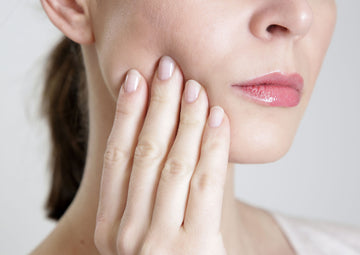

They say laughter is the best medicine, but sometimes just a smile will do.
Studies show that putting a smile on your face has the power to relieve anxiety, strengthen relationships, and even reduce your risk of heart disease. We cover 11 psychological and physical health benefits to smiling such as:
- Releases endorphins
- Alleviates stress
- Reduces blood pressure
- Strengthens immune system
- Increases endurance
- Reduces pain
- Boosts mood
- Reduces risk of heart disease
- Strengthens relationships
- Relieves anxiety
- Correlates to a longer life
Don’t just take our word for it! We reached out to experts to understand the real science-backed health benefits of smiling in our guide and infographic below.
1. Releases Endorphins

Endorphins are happy hormones. They can make us feel joyful and warm inside. When you smile, your body releases endorphins, dopamine, and serotonin. These are feel-good neurotransmitters that create a party in your brain — elevating your mood, alleviating stress, and relaxing your body.
When we smile, we flex certain muscles in our face. This movement tells our brain that we’re smiling which, in turn, initiates the release of endorphins. This is known as the facial-feedback hypothesis — a theory that states that our facial expressions not only communicate how we feel to others but also to ourselves.
2. Alleviates Stress
Thinking positively or focusing on your breath during stressful times is easier said than done. Chris Norris, a Psychiatrist, Neurologist, and Managing Editor at Sleep Standards, introduces a new stress-relieving technique: smiling. “Smiling when you're really happy or even if you’re sad helps you to deal with stressful times,” he says.
As we mentioned earlier, smiling signals to our brain to release endorphins. It also tells the brain to release neuropeptides — tiny proteins that can help lessen stress. A study conducted by psychological scientists at the University of Kansas found that “smiling during brief stressors can help to reduce the intensity of the body’s stress response, regardless of whether a person actually feels happy.” Next time you start to feel your heart rate rise as a result of stress, focus on putting a smile on your face. You can fake it until you make it or search for a funny video on YouTube.
3. Reduces Blood Pressure

When we are stressed, our heart rate increases and our blood pressure rises. Just like smiling through a worrying situation can help lower stress levels, smiling can also help lower blood pressure. According to Chris Norris, “smiling and laughing initially increases heart rate, then relaxes the muscle, and eventually decreases the heart rate and blood pressure.” Smiling isn’t just an expression you can wear, but a way to improve your overall health.
4. Strengthens the Immune System
With the onset of the COVID-19 pandemic, strengthening one’s immune system has been at the forefront of a lot of people’s minds. In addition to that immunity-boosting tea mom gave you, try smiling more.
According to Dr. Lina Velikova, MD, Ph.D., and Medical Advisor at Supplements101, “laughter and positive thinking increase immune response, allowing us to be less prone to diseases.” Humor — which often leads with a smile — can raise levels of immune cells and boost infection-fighting antibodies.
5. Increases Endurance

Dr. Velikova says that “one of the most important factors in athletic endurance is perceived effort.” Perceived effort is how hard you feel your body is working, regardless of how hard it might actually be working. She goes on to say that “smiling can help in decreasing perceived effort and increase athletic performance.”
One study found that runners used less energy in their workouts when they deliberately smiled through it. They also found that the runners reported a higher perceived effort when frowning during their run as opposed to smiling. Next time you’re working out, put on a funny podcast and see how you feel.
6. Reduce Pain
When we laugh, our body releases its own natural painkillers (also called endorphins). These endorphins have moderate pain-relieving benefits. Sarah Pressman, UCI professor of psychological science, helped conduct a study published in the journal of Emotion that took a look at different emotions and their impact on discomfort and pain.
They analyzed pain levels related to the injection of a needle — no bigger than one you may see when getting a typical flu shot. They found that those who were smiling during the injection reported the injection hurt about half as much as those who were not smiling. So, what does this all mean? There could be a correlation between pain and the facial expression you convey. The next time you’re going in to get a shot, put a grin on your face, and smile through the pain! It might actually help.
7. Boosts Mood

Typically, when we are happy we smile, and when we are sad we frown. These actions are directly related to the corresponding emotion. Some studies suggest that the physical act of smiling can trick your brain into thinking you’re happy. For example, a study conducted by the psychologists at the University of Cardiff in Wales found that those who received Botox injections that hindered their ability to frown reported being happier in general than those that can frown normally.
Another study, published by the American Psychological Association, discovered that a smile — even when it’s forced — can generate more positive emotions. Other studies report that frowning can make you feel unhappier. So, next time you’re feeling down, crack a smile and monitor your state of mind — you may notice a lift in your mood. However, if you suffer from depression or anxiety, or have persistent symptoms, you should contact a healthcare provider.
8. Reduces Risk of Heart Disease
According to the CDC, heart disease is the leading cause of death in the United States and high blood pressure is one of the key risk factors. Dr. Lina Velikova says that “smiling and laughter increase heart rate; however, soon after, muscles relax, blood pressure and heart rate drop, reducing the risk of developing heart disease.” Because smiling can reduce blood pressure, adding a smile or two to your day could improve your heart health and put you at less risk of developing heart disease.
9. Strengthens Relationships

A smile goes a long way! Smiling can help you succeed in both your personal and professional life. Research suggests that those who express positive emotions and who are happier, in general, are more likely to achieve goals at work and in their everyday lives.
Another study found that people who smile were perceived as “more likable” and can therefore form better relationships. An additional study published in the Journal of Personality and Social Psychology found that positive expressions like smiling predicted more “favorable outcomes” in life such as successful marriages and personal wellbeing and satisfaction.
10. Relieves Anxiety
Anxiety and stress can feel similar and sometimes go hand in hand. Anxiety can trigger stress just like stress can cause anxiety. As we mentioned, smiling can help reduce stress levels, so we can assume smiling can also help relieve anxiety.
One study conducted by the Journal of Maternity Care and Reproductive Health found that smile therapy helped reduce anxiety in pregnant women. Sometimes smiling can help trigger happier thoughts — curbing negative emotions and reducing your anxiety in the interim.
11. Correlates to a Longer Life

This one may be a bit of a stretch, but hey — who wouldn’t want to smile their way to immortality? A 2010 study looked at photographs of MLB players and rated the intensity of their smiles. They concluded that players who were perceived to be smiling fully and who expressed positive emotions were associated with longer life spans. There isn’t much other information on whether a smile is related to a longer life, however, it definitely doesn’t hurt.
How Smiling Affects the Brain
Smiling has several benefits and it can even improve your health. But how exactly does smiling affect the brain?
According to Dr. Lina Velikova, “the simple act of smiling activates neural messaging that increases our brains’ health.” When we smile, our brain releases neuropeptides that drive away stress. Our brain also releases “happy hormones” such as dopamine, endorphins, and serotonin. “The endorphins also work as natural painkillers, which improve our pain endurance, and serotonin improves our mood,” Dr. Lina Velikova says.
5 Creative Ways to Smile More
Smiling isn’t always easy. When we’re overwhelmed with the stress of a bad day or happen to be the recipients of terrible news, turning that frown upside down may seem impossible. If you’re looking for unique ways to add more smiles to your day, try practicing some of the tips below.
- Practice gratitude in the morning: Instead of checking your work email or snoozing your alarm each morning, count all the things you’re grateful for. You can do this while brushing your teeth, while in the shower, or you can write it down in a gratitude journal — whatever works best for you.
- Spend more time in nature: Spending time outside can enhance your wellbeing, your mood, and your likelihood of smiling. Make it a habit to go on a short walk each day or enjoy your morning coffee outside.
- Do one good thing for yourself (or others) every day: Self-care and helping others is one of the most rewarding ways to put a smile on your face.
- Read and/or watch something funny: They say you are what you eat, and that includes the media you consume. Put down the crime novel and pick up something a little more light-hearted.
- Remind yourself to smile: Leave subtle reminders for yourself to smile more. It can be a magnet on your refrigerator, a note on your desk while you work from home, or even an image on your phone background.
A smile is defined as a pleased, kind, or amused expression that typically happens when the corners of the mouth are turned up and the front teeth are exposed. Taking care of your teeth and oral health is an easy way to encourage yourself to smile more. It’s as simple as brushing twice a day, flossing regularly, and investing in teeth whitening products that will brighten your unique smile. If you’re looking for additional reasons to smile more, check out our infographic below or download our motivating smile printable above!
The Importance of Checking in With Yourself
Yes, smiling boasts many benefits, but it's not a cure-all for the problems you may face in life. Smiling can remind us to think positively and let go of the small stuff. It should be done in tandem with other healthy behaviors and habits such as meditating, reading, spending time with family, and doing what makes you happy. We know smiling won’t solve the world's problems, but it doesn’t hurt them either.
It’s important to check in with yourself on a daily basis. When you wake up in the morning, note how you feel. If you notice putting a smile on your face doesn’t help your mood, or you experience more serious symptoms, consider contacting a professional for help. We could all use a smile and a little extra help sometimes.






